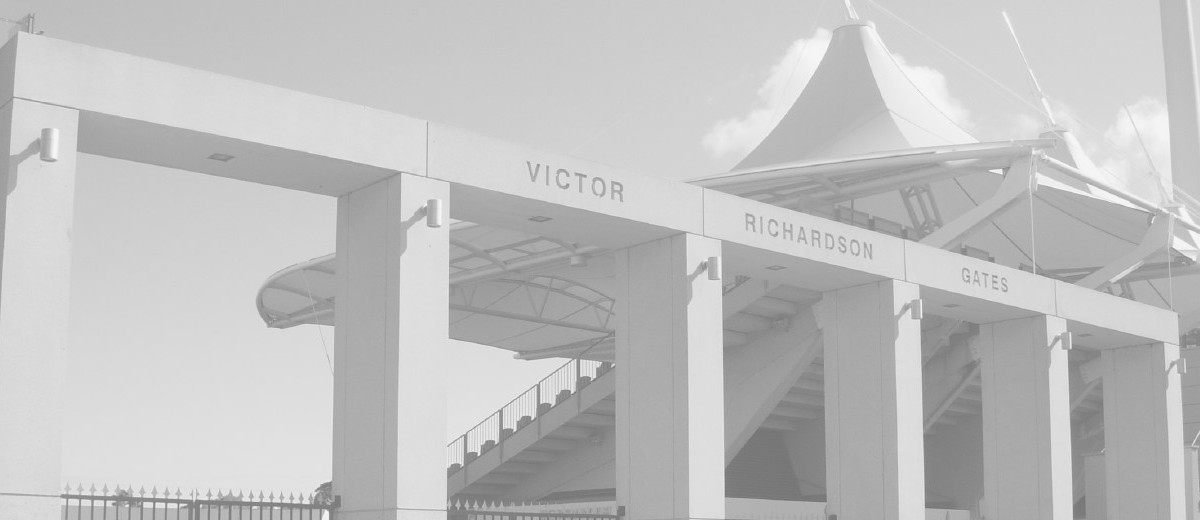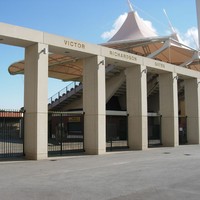Thing
ContributeThe Victor Richardson Gates at the south-eastern entrance of Adelaide Oval commemorate the remarkable sporting career of Victor York Richardson OBE (1894–1969).
The sporting life
Although variously employed as a public servant, salesman, representative, sports journalist, sports editor, and radio and television sports broadcaster, it was as a sportsman that Richardson was a household name in the days before sport became an occupation. Predominantly a cricketer and Australian Rules footballer, he also played tennis, golf, basketball, baseball (state level in 1921) and lacrosse (district level in 1921) and did gymnastics.
Richardson made his Test cricket debut in 1924 against England and in a 19 Test match career he captained the Australian team on tour in New Zealand (1928), North America (1932) and South Africa (1935–36) and was vice-captain in England (1930) and the ‘Bodyline series’ in Australia (1932–33). During his state career from 1919 to 1937 he captained South Australia from 1921 to 1935. He captained his local club, Sturt, from 1921 until retiring in 1941 when he enlisted in the Royal Australian Air Force and served overseas in the Second World War.
In football he played for the Sturt Football Club from 1915 to 1927, including as captain (1920 and 1922–24), winning premierships (1915, 1919 and 1926) and being awarded the 1920 Magarey Medal posthumously in 1998. He captained the South Australian state team in 1923 and 1924.
The gates
The five iron gates were set between rectangular arches. Those each side of the centre featured two double-sided bronze reliefs created by sculptor John Dowie. The relief on the southern side depicted groups of football players vigorously competing for the ball during a game. The northern relief showed cricketers batting, bowling and fielding. Richardson’s features could be seen on the batsman facing at the crease (Cameron, p131).
In 1965 Lord Mayor James Campbell Irwin, an Adelaide architect, initiated moves to honour Richardson. The next year a public appeal supported by the South Australian Cricket Association (SACA) and the South Australian National Football League (SANFL) raised funds for a commemorative feature in the city. Gates at Adelaide Oval were selected as an appropriate tribute. A small road leading to Adelaide Oval from King William Road was named Victor Richardson Drive in 1966.
Architect Ian Hannaford supervised the design and construction of the gates. The reliefs by John Dowie were added when more than £5000 was raised.
Lord Mayor Walter Bridgland officiated at the opening ceremony on 28 October 1967. Alderman Irwin opened the gates. Guests included the SACA and SANFL presidents, Sir Donald Bradman and Don Brebner. The ceremony was held during a lunch break at a Sheffield Shield game, enabling the South Australian and Victorian Sheffield Shield teams to form a guard of honour each side of the dais. Among them were two of Richardson’s grandsons, Ian and Greg Chappell, notable South Australian and Australian cricketers in their own right.
The central bronze plaque, installed following the death of Richardson two years later, records some of his significant sporting achievements and the admiration of many people.
Recent times
When the Chappell Stands were built on the eastern side of Adelaide Oval in 2003 the gates were dismantled and relocated slightly northwards with a sandblasted and honed colonnade of towering precast concrete pillars and a capping beam replacing the original metal framework. The stands, named in honour of Richardson’s national cricket team grandsons (Ian, Greg and Trevor), were demolished in April 2012 and the Victor Richardson Gates were repositioned at the revamped stadium in March 2014.
Media
Add mediaImages

Victor Richardson Gates, Adelaide Oval, South Australia., 2006, http://www.flickr.com/photos/adelaide_archivist/3158559541/, Creative Commons

Courtesy of/Photographer: Mowling. All rights reserved. Not to be reproduced without permission




Comments
CommentAdd new comment
Thanks Peter
The gates have now been re-installed - their new position, in the southeast corner, was not known to us at the time the entry was uploaded.
We'd like to hear more about the architect of the gates - to our knowledge, Ian Hannaford supervised the work.
Will the gates be re-installed?
No mention of the architect! It may be pertinent, in lieu of the close proximity of two of his brother's sculptures.
When will my interstate guests again have access to the Bradman statue?
Peter